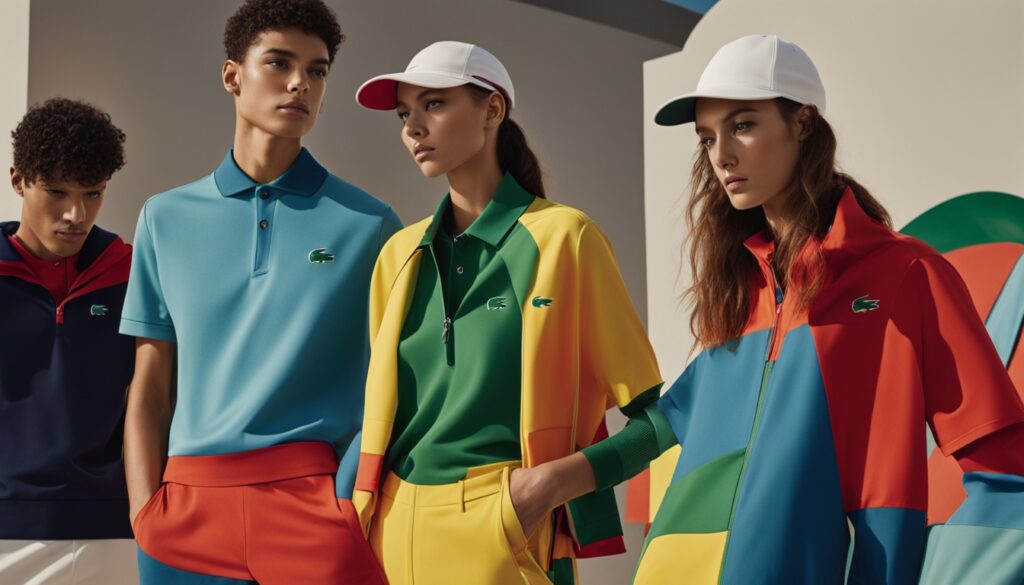Have you ever thought about using a piece that combines style and sustainability? Lacoste is leading the way, merging fashion and responsibility. In Brazil, this story has gained more and more attention.
Key Highlights
- Lacoste operates six factories worldwide and has over 1,100 stores.
- By 2025, Lacoste plans to have a thousand employees assisting vulnerable youth and to support 10,000 vulnerable individuals in their social or professional integration.
- The “Open Game” program by Lacoste in Brazil has benefited over 334 children since 2006.
- The Lacoste Foundation has helped 70,000 disadvantaged young people aged 6 to 21 since 2006.
- Brazil is the fourth most strategically important market for Lacoste, after France, the United States, and China.
Lacoste’s Journey in Brazil
Lacoste in Brazil began in the 1980s with a partnership with Paramount Têxteis, led by entrepreneur Fuad Mattar.
Since then, Lacoste has gained many fans thanks to well-planned strategies.
Start of Operations in the Brazilian Market
In 2008, Lacoste was acquired by Maus Frères, a Swiss holding company, and began operating in partnership with Devanlay Ventures of Brazil and Vesuvio of Argentina.
This partnership boosted Lacoste’s growth in Brazil. By 2018, Lacoste took full control of its operations in Latin America, highlighting the success of its expansion strategy.
Gaining Fans and Expanding in the Country
Lacoste has gained many fans in Brazil, partly due to actions like creating an Instagram account.

Today, Brazil is one of Lacoste’s four most important markets, alongside the United States, France, and China. This demonstrates the growing importance of Brazil to the brand.
Lacoste’s Strategic Priorities in Brazil
Lacoste is focused on growing in Brazil, emphasizing improving its online presence and expanding its stores. The brand intends to use more marketing and social media to strengthen its image and reach new customers.
Investments in Marketing and Social Media
In 2022, Lacoste intensified its marketing efforts in Brazil, collaborating with influencers to broaden its reach. A notable example is the Lacoste Brazil Instagram account, which reached 1 million followers in December 2021, exceeding expectations.
Increasing the Retail Network
Lacoste plans to triple the number of its stores in Brazil over two years, with a design inspired by tennis courts. Additionally, it aims to increase the number of franchises from 42 to 65 to strengthen its presence in the country.
With more marketing and stores, Lacoste seeks to become one of the leading sport fashion brands in Brazil, attracting more customers across the country.
Lacoste: A Fashion Sport Brand
Lacoste is a brand that stands out in the fashion and sport segment, offering a unique experience to Brazilian consumers. With iconic pieces like the famous polo shirt, Lacoste blends fashion and sport to create a fashion sport style.
Lacoste collections are known for their quality fabrics and modern design, providing comfort and style. The brand invests in innovative technologies to enhance its sportswear, such as breathable and moisture-wicking fabrics.
Partnerships with elite athletes, such as Novak Djokovic and Daniil Medvedev, reinforce the brand’s connection with sport. Recently, Lacoste shifted from New York Fashion Week to Paris Fashion Week, consolidating its presence in the global market.
| Product | Price | Discount |
|---|---|---|
| Men’s Polo Shirt | $269.00 | 30% off |
| Women’s Training Jacket | $439.00 | 40% off |
| Unisex Sports Shoes | $599.00 | 50% off |
Lacoste offers a wide range of products, from polo shirts and training jackets to pleated skirts and bags. Each piece combines elegance and functionality, allowing consumers to express their fashion sport style on various occasions.

“Lacoste is a brand that perfectly balances the world of fashion and sport, offering pieces that combine beauty, comfort, and performance.”
Local Production and Operational Flexibility
Lacoste is expanding its local production in Brazil. Previously, 90% of footwear was imported; now, over half comes from national suppliers. Polo shirts are also starting to be made in Brazil, with new products planned to be 100% locally produced.
This strategy aims to increase responsiveness to customers and provide sport products more quickly and flexibly.
Conclusion
Lacoste continues to be a standout brand in Brazil, combining style and sustainability with a strong presence in marketing and a wide range of products. Its commitment to local production and social responsibility demonstrates its dedication to building a more sustainable and responsible future.
